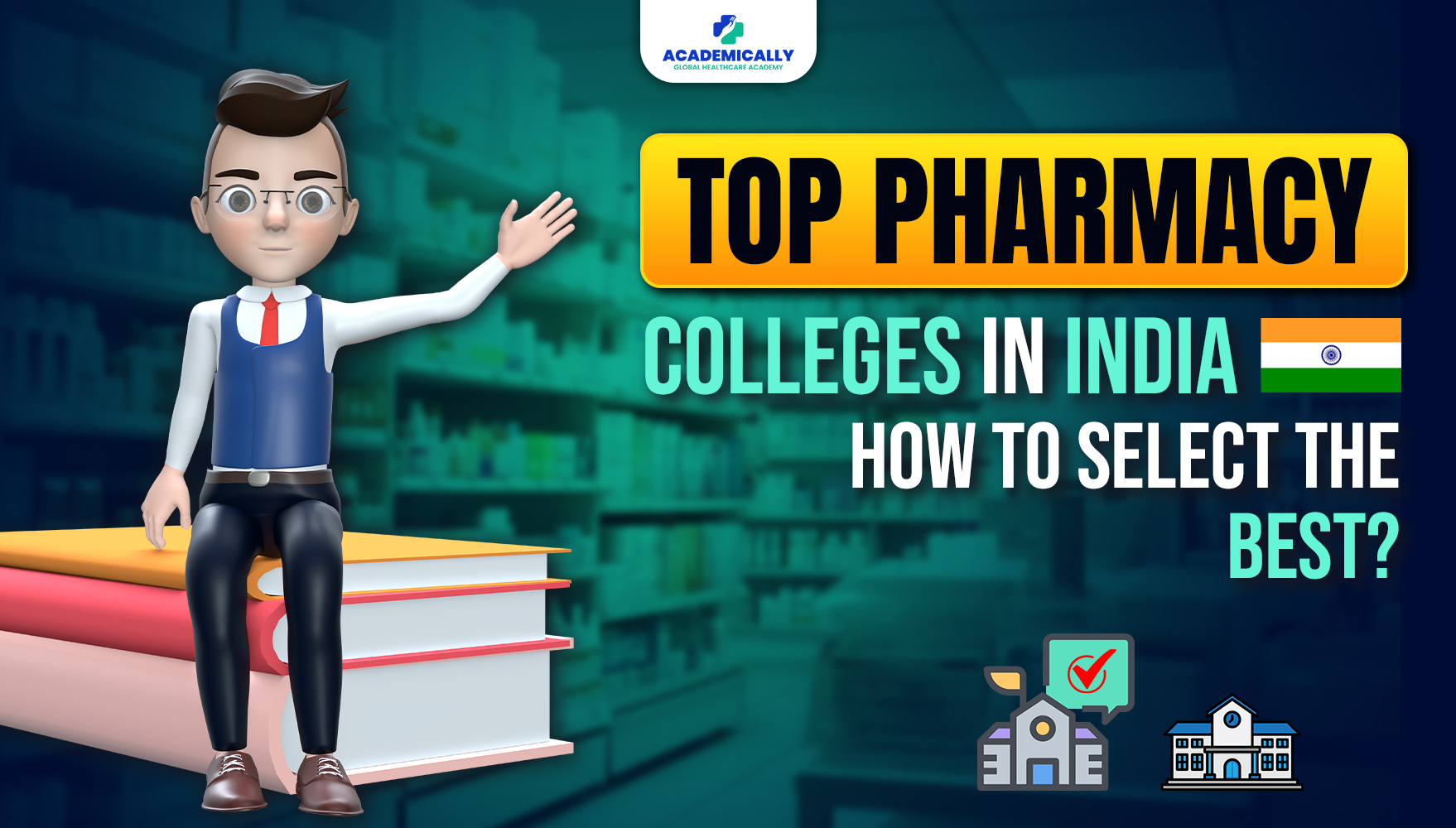Top Pharmacy Colleges in India
In India, there are over 4,000 pharmacy colleges. More than 1,900 are private, over 280 are government-owned, and about 70 are semi-government institutions. Let's look at the top 25 pharmacy colleges in India.
| Rank | Name | City | State |
| 1 | National Institute of Pharmaceutical Education and Research Hyderabad | Hyderabad | Telangana |
| 2 | Jamia Hamdard | New Delhi | Delhi |
| 3 | Birla Institute of Technology & Science -Pilani | Pilani | Rajasthan |
| 4 | JSS College of Pharmacy | Ooty | Tamil Nadu |
| 5 | Institute of Chemical Technology | Mumbai | Maharashtra |
| 6 | National Institute of Pharmaceutical Education and Research, Mohali | Mohali | Punjab |
| 7 | JSS College of Pharmacy | Mysore | Karnataka |
| 8 | Panjab University | Chandigarh | Chandigarh |
| 9 | Manipal College of Pharmaceutical Sciences, Manipal | Udupi | Karnataka |
| 10 | Amrita Vishwa Vidyapeetham | Coimbatore | Tamil Nadu |
| 11 | SVKM`s Narsee Monjee Institute of Management Studies | Mumbai | Maharashtra |
| 12 | National Institute of Pharmaceutical Education and Research Guwahati | Guwahati | Assam |
| 13 | National Institute of Pharmaceutical Education and Research Ahmedabad | Gandhinagar | Gujarat |
| 14 | National Institute of Pharmaceutical Education and Research Raebareli | Lucknow | Uttar Pradesh |
| 15 | S.R.M. Institute of Science and Technology | Chennai | Tamil Nadu |
| 16 | Chitkara University | Rajpura | Punjab |
| 17 | Lovely Professional University | Phagwara | Punjab |
| 18 | Jadavpur University | Kolkata | West Bengal |
| 19 | Central University of Punjab | Bathinda | Punjab |
| 20 | Babasheb Bhimrao Ambedkar University | Lucknow | Uttar Pradesh |
| 21 | Amity University | Gautam Budh Nagar | Uttar Pradesh |
| 22 | AU College of Pharmaceutical Sciences, Andhra University | Visakhapatnam | Andhra Pradesh |
| 23 | Banasthali Vidyapith | Banasthali | Rajasthan |
| 24 | I. S. F. College of Pharmacy | Moga | Punjab |
| 25 | Delhi Pharmaceutical Sciences and Research University | Delhi | Delhi |
Admission Steps
Admission into pharmacy colleges in India typically involves the following steps:
Eligibility Criteria: Candidates must meet the respective pharmacy colleges and regulatory authorities' eligibility criteria. Generally, candidates must have completed their higher secondary education (10+2) with Physics, Chemistry, and Biology/Mathematics as compulsory subjects.
Entrance Examinations: Many pharmacy colleges in India conduct entrance examinations for undergraduate and postgraduate pharmacy program admission. Some commonly recognised entrance exams include:
- Graduate Pharmacy Aptitude Test (GPAT)
- States conduct state-level pharmacy entrance exams like MHT CET, CUET, AP EAMCET, etc.
Application Process: Candidates must apply for the entrance exams by filling out the application forms available on the respective exam websites or through designated application portals. They must meet the eligibility criteria and submit the required documents and the application form.
Admission Counseling: After announcing the entrance exam results, colleges or centralised counselling authorities call qualified candidates for counselling sessions. During counselling, candidates are allotted seats based on their exam ranks, preferences, and availability of seats in various colleges.
Document Verification and Seat Confirmation: Candidates allotted seats during counselling need to undergo document verification to confirm their eligibility for admission. Once the verification process is completed and the necessary formalities are fulfilled, candidates can secure admission by paying the prescribed fees.
Direct Admission: Besides entrance exams, some pharmacy colleges may offer direct admission to candidates based on merit in their qualifying examinations (10+2 or equivalent). The admission process may vary from college to college, and candidates should check the specific admission criteria of each institution.
How to Select the Best Pharmacy College?
Selecting the best pharmacy college requires careful consideration of various factors to ensure it aligns with your academic, career, and personal goals. Here's a guide on choosing the best pharmacy college:
Accreditation and Recognition: Verify if the college is recognised by regulatory bodies such as the Pharmacy Council of India (PCI) and accredited by relevant accreditation agencies. Accredited colleges often maintain high academic standards and provide quality education.
Academic Programs and Specialisations: Evaluate the educational programs offered by the college, including the Bachelor of Pharmacy (B.Pharm), Master of Pharmacy (M.Pharm), and doctoral programs. Consider whether the college offers specialisations or areas of focus aligned with your interests and career aspirations.
Faculty Expertise and Research Opportunities: Research the qualifications and expertise of the faculty members in the pharmacy department. Look for colleges with experienced faculty actively engaged in research, publications, and industry collaborations. Research opportunities can enhance your learning experience and career prospects.
Infrastructure and Facilities: Visit the college campus or explore virtual tours to assess available infrastructure and facilities. Consider well-equipped laboratories, library resources, computer facilities, and student support services. Adequate infrastructure contributes to a conducive learning environment.
Accommodation and Location: Consider the college's location and availability of accommodation options. Evaluate proximity to industry hubs, healthcare facilities, and research institutions.
Student Support Services: Research the student support services offered by the college, including academic counselling, career guidance, mentoring programs, and extracurricular activities. A supportive environment fosters holistic development and enhances the overall student experience.
Alumni Network and Reputation: Explore the college's alumni network and reputation in the industry. Alumni networking events, alumni testimonials, and alumni success stories can provide insights into the college's reputation and the opportunities available to graduates.
Reviews and Feedback: Seek feedback from current students, alumni, and industry professionals about their experiences with the college. Online reviews, forums, and social media platforms can offer valuable insights into the college's strengths, weaknesses, and overall reputation.
Financial Considerations: Evaluate the tuition fees, scholarship opportunities, and financial aid options available at the college. Consider your budget and explore scholarships, grants, and student loan options to finance your education.
Scope of Pharmacy
Pharmacy offers a diverse scope beyond medication dispensing:
- Clinical Pharmacy: They optimise medication therapy and manage chronic conditions.
- Pharmaceutical Industry: Pharmacists contribute to drug development, quality control, and regulatory affairs.
- Hospital Pharmacy: They oversee drug administration and ensure safe medication practices.
- Community Pharmacy: Pharmacists provide healthcare services, including medication dispensing and counselling.
- Academic and Research Roles: Pharmacists teach, research, and contribute to pharmaceutical sciences.
- Regulatory Affairs: They ensure compliance with regulations governing the safety of pharmaceutical products.
- International Opportunities: Pharmacists work abroad in healthcare systems, pharmaceutical companies, and NGOs, addressing global health challenges.

In Closing
Selecting the best pharmacy college in India involves thorough research consideration of various factors. Aspiring pharmacy students must prioritise their personal and academic goals while aligning them with the offerings of each college.
By carefully evaluating these factors and possibly visiting campuses, students can make informed decisions that will shape their academic and professional futures in pharmacy.
Remember, the right college choice can significantly impact one's learning experience and career trajectory in this dynamic and crucial healthcare discipline.
Even after choosing the best pharmacy college in India, students' hard work remains vital for success. While the college provides resources and opportunities, students' dedication, perseverance, and active academic and extracurricular participation are essential for achieving excellence. Ultimately, the students' continuous efforts determine their success in pharmacy.
Fill up this form for a free one on one counselling session.





